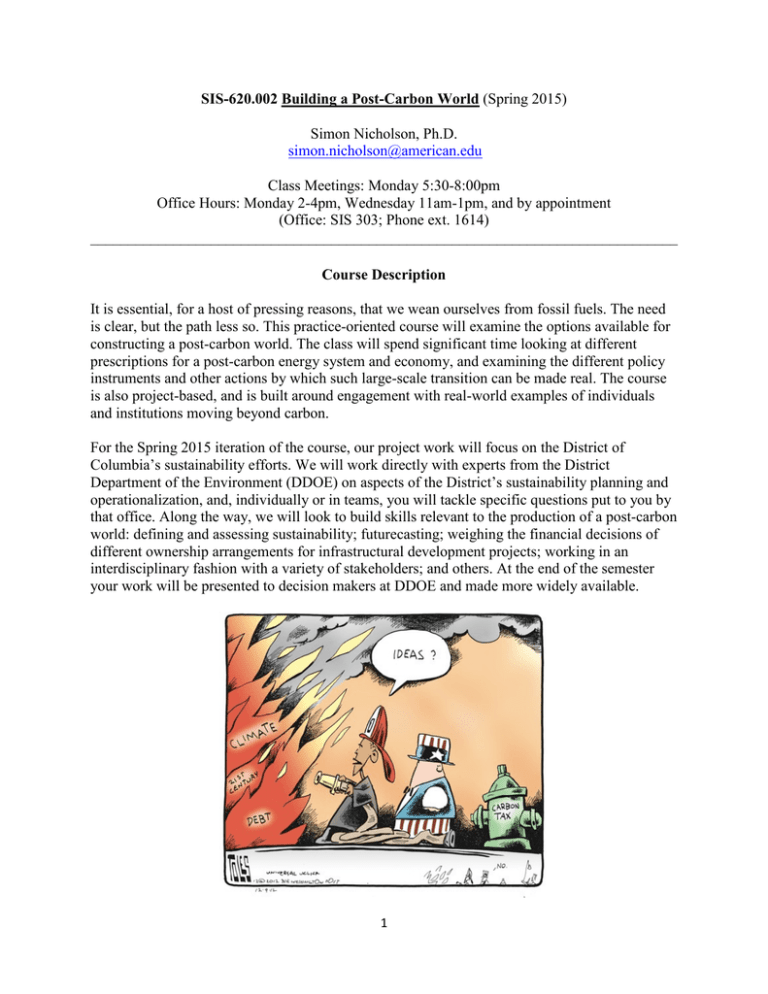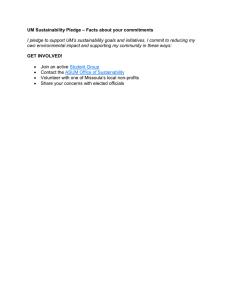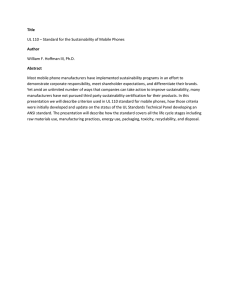SIS-620.002 Building a Post-Carbon World Simon Nicholson, Ph.D. Class Meetings: Monday 5:30-8:00pm
advertisement

SIS-620.002 Building a Post-Carbon World (Spring 2015) Simon Nicholson, Ph.D. simon.nicholson@american.edu Class Meetings: Monday 5:30-8:00pm Office Hours: Monday 2-4pm, Wednesday 11am-1pm, and by appointment (Office: SIS 303; Phone ext. 1614) ______________________________________________________________________________ Course Description It is essential, for a host of pressing reasons, that we wean ourselves from fossil fuels. The need is clear, but the path less so. This practice-oriented course will examine the options available for constructing a post-carbon world. The class will spend significant time looking at different prescriptions for a post-carbon energy system and economy, and examining the different policy instruments and other actions by which such large-scale transition can be made real. The course is also project-based, and is built around engagement with real-world examples of individuals and institutions moving beyond carbon. For the Spring 2015 iteration of the course, our project work will focus on the District of Columbia’s sustainability efforts. We will work directly with experts from the District Department of the Environment (DDOE) on aspects of the District’s sustainability planning and operationalization, and, individually or in teams, you will tackle specific questions put to you by that office. Along the way, we will look to build skills relevant to the production of a post-carbon world: defining and assessing sustainability; futurecasting; weighing the financial decisions of different ownership arrangements for infrastructural development projects; working in an interdisciplinary fashion with a variety of stakeholders; and others. At the end of the semester your work will be presented to decision makers at DDOE and made more widely available. 1 Requirements In-Class Participation (10% of grade): This course will be conducted as a seminar. Because of this, a high-quality classroom experience requires the active, informed participation of all members of the class. You are expected to attend our class meetings, to read all assigned material before each class session, and to participate in a committed manner to discussions. Final Project (45% of final grade): Your major task this semester will be to engage with and inform the District of Columbia’s drive to sustainability. You have the option of working as part of a group focused on a large project or working as an individual to put together a final research paper. Either way, your work will be directed toward some aspect of the District of Columbia’s sustainability plan, and your research questions and deliverables will be developed in consultation with experts from the District Department of the Environment (DDOE). - - For individual researchers, you will propose, by 2/02, a research project that builds from our conversations with DDOE experts. Please turn in a 1-page written statement outlining the work you expect to conduct this semester. You should at a minimum describe your major questions/puzzle, and the means by which you will complete your work. For teams, you should look to have conversations with Prof. Nicholson and relevant people at DDOE in advance of the 2/02 deadline. Again, the first written statement outlining your project should be limited to around 1 page. Note that 35% of your final grade will be for a final paper/report or multimedia project that you develop, and 10% for a final presentation to the class and to DC stakeholders. We will talk in detail in class about the different options available to you as you think about ways to present your research findings. Final projects will be due 5/4. Presentations will be on 4/20 or 4/27. Research Blogging (10% of grade): I will ask you, either as a research team or as an individual researcher, to set up a project blog this semester. You will use the blog to keep track of your project work, and to share interesting pieces of relevant information with the rest of the class and with our colleagues at DDOE. I will also ask questions from time to time that you should tackle via the blog. My expectation is that each participant in the course will post to a blog at least once per week. We will talk further about expectations in class. Paper: The Urban Energy Challenge (15% of grade): You will write a short (5-7 page) individual background and synthesis paper to help us think through the challenges of post-carbon transition in the urban context. I would like you, in your paper, to focus on a non-US city. Describe the city, focusing particularly on energy production and use, and on any notable sustainability conversation or plan within that city. What opportunities does the city have for post-carbon transition? What are the impediments? What can be learned from your chosen city’s experience as we look to build a more sustainable DC? Due 2/16. 2 Group in-class presentation (5% of grade): For the session on 2/23 I will largely turn the class over to you to make presentations to your peers about the links between energy choices and other spheres of environmental concern. I have in mind presentations on energy and biodiversity, water, food, and social arrangements. I am also open to other ideas. The task is to come up with a sharp, snappy presentation for a general audience, setting out the importance of examining links between energy and these other areas, offering tools and frameworks for effective analysis, and giving some sense of the path ahead. Mid-term Op-Ed (15% of final grade): You will write an op-ed style piece midway through the semester, around 750 words in length. We will discuss effective op-ed writing in class. I suggest that you use this op-ed assignment as a way to develop your final paper. That is, your op-ed can (and ideally will) examine some aspect of your ongoing research. This op-ed should be submitted to me in class on or before 3/23. Learning Outcomes Those who participate fully in this course should by its end: 1. Have a working understanding of the causes and implications of a range of global environmental challenges, and of different approaches to their resolution; 2. Be able to identify and talk knowledgably about the connections between energy production and consumption and other environmental and social concerns; 3. Understand the different broad-stroke options that exist for transitioning the world to post-carbon energy sources; 4. Have developed a set of useful skills in the areas of energy and / or sustainability assessment; 5. Appreciate the practical and ethical dimensions of post-carbon transition. Grading Scale: A 93-100 A- 90-92 B+ B B- 87-89 83-86 80-82 C+ 77-79 C 73-76 C- 70-72 D+ 67-69 D 63-66 D- 60-62 F < 59 An “A” grade is awarded for excellent or superior work; a “B” grade for work that is above average; a “C” grade for work that is average; a “D” for below average work; and an “F” for work that is incomplete or exceptionally poor. 3 ______________________________________________________________________________ Academic Integrity: All students are expected to abide by the Academic Integrity Code of American University (available online at http://www.american.edu/academics/integrity/code.htm ). Note that I take plagiarism, whether deliberate or unintentional, very seriously. Please take care with your work. ______________________________________________________________________________ EMERGENCY PREPAREDNESS FOR DISRUPTION OF CLASSES In the event of an emergency, American University will implement a plan for meeting the needs of all members of the university community. Should the university be required to close for a period of time, we are committed to ensuring that all aspects of our educational programs will be delivered to our students. These may include altering and extending the duration of the traditional term schedule to complete essential instruction in the traditional format and/or use of distance instructional methods. Specific strategies will vary from class to class, depending on the format of the course and the timing of the emergency. Faculty will communicate classspecific information to students via AU e-mail and Blackboard, while students must inform their faculty immediately of any absence. Students are responsible for checking their AU e-mail regularly and keeping themselves informed of emergencies. In the event of an emergency, students should refer to the AU Student Portal, the AU Web site (www.prepared.american.edu) and the AU information line at (202) 885-1100 for general university-wide information, as well as contact their faculty and/or respective dean’s office for course and school/college-specific information. Readings I will ask you to buy a copy of David Keith, A Case for Climate Engineering, (MIT Press, 2013). There are no other required books for the course. All articles and book chapters can be found through e-reserves on Blackboard, or via url’s listed in the syllabus. 4 CLASS SCHEDULE 1/12: Intro Session – Energy Regimes Past and Present * J R McNeill, Something New Under the Sun, (Norton: 2000) Ch. 1 (“Prologue”) and Ch. 10 (“Fuels, Tools, and Economics”). * John Holdren, “The Energy Innovation Imperative,” [Spring 2006] Innovations available at http://belfercenter.ksg.harvard.edu/files/innovations_the_imperative_6_06.pdf * Jeff Tollefson and Richard Monastersky, “Awash in Carbon,” available at www.nature.com/polopoly_fs/1.11909!/menu/main/topColumns/topLeftColumn/pdf/491 654a.pdf * Damian Carrington, “Leave Fossil Fuels Buried to Prevent Climate Change, Study Urges,” [January 7, 2015] Guardian available at www.theguardian.com/environment/2015/jan/07/much-worlds-fossil-fuel-reserve-muststay-buried-prevent-climate-change-study-says 1/19: NO CLASS – MLK DAY 1/26: Project Introductions – Meeting with DDOE * Ronnie Lipschutz, “Sustainability as a Social Project” (introduction to forthcoming volume titled Handbook to Social and Ecological Sustainability) available at http://seed.soe.ucsc.edu/wp-content/uploads/2012/05/Sustainability-as-a-SocialProject.pdf * UN Habitat, “The State of the World’s Cities 2012/2013,” Read overview and key findings, available at http://unhabitat.org/?wpdmact=process&did=MTQ3My5ob3RsaW5r * David Orr, “Human Ecology as a Problem of Ecological Design,” in David Orr, ed., The Nature of Design, New York: Oxford University Press 2002. * Read the “Sustainable DC” plan and related materials: http://sustainable.dc.gov/finalplan 5 2/02: Future Energy Regimes—Broad Stroke Options for Transition * Rob Hopkins, “An Arc of Scenarios,” in Princen and De Young, The Localization Reader (MIT Press: 2012) pp. 59-68. * Paul Gilding, The Great Disruption, (Bloomsbury Press, 2011) chapters 7 and 8. * J. C. MacKay, Sustainable Energy: Without the Hot Air, (UIT Cambridge, 2009) available free online at www.withouthotair.com. Read chapter 27 “Five Energy Plans for Britain”. * Jay Griffiths, “The Transition Initiative: Changing the Scale of Change,” [July/August 2009] Orion available at www.orionmagazine.org/index.php/articles/article/4792/ * National Academies, “America’s Energy Future: Technology and Transformation” (Overview and Summary) (2009) Read executive summary closely; skim remainder. Available at www.princeton.edu/mae/people/faculty/socolow/americas-energyfuture.pdf?__toolbar=1 * Paul Roberts, “The Last Drops: How to Bridge the Gap Between Oil and Green Energy,” http://www.popsci.com/technology/article/2011-06/last-drops-how-bridge-gap-between-oil-andgreen-energy 2/09: Thinking Through Technology * Langdon Winner, The Whale and the Reactor, (University of Chicago Press: 1986), Chapter 2 “Do Artifacts Have Politics?” * Nathaniel Hawthorne, “The Birthmark,” in Leon Kass (ed.) Being Human: Core Readings in the Humanities (W W Norton, 2004) pp. 5 – 20. * Lev Grossman, “2045: The Year Man Becomes Immortal,” [Feb 10, 2011] Time available at www.time.com/time/printout/0,8816,2048299,00.html * Bill Joy, “Why the Future Doesn’t Need Us,” (2001) Wired 8(4), available online at www.wired.com/wired/archive/8.04/joy.html * Chellis Glendinning, “Notes Toward a Neo-Luddite Manifesto,” [March/April 1990] Utne Reader available at www.jesusradicals.com/wp-content/uploads/ludditemanifesto.pdf 6 2/16: Technological Salvation? Climate Engineering? [Synthesis Paper Due] * Simon Nicholson, “The Promises and Perils of Geoengineering,” in Worldwatch Institute, State of the World 2013: Is Sustainability Still Possible? (Island Press, 2013). Available at http://dcgeoconsortium.files.wordpress.com/2013/11/nicholson-thepromises-and-perils-of-geoengineering.pdf * David Keith, A Case for Climate Engineering, (MIT Press, 2013). * Clive Hamilton, “Geoengineering and the Politics of Science,” Bulletin of the Atomic Scientists (2014) 70, pp. 17-26. 2/23: Energy and … (Transportation, Water, Waste, Food, Biodiversity, etc) (Group presentation week) 3/02: Project Week - Check in, + individual and group work 3/9: NO CLASSES – SPRING BREAK 3/16: Measuring Sustainability – Tools for the Transition Readings TBA 3/23: Keeping Justice in View [Op ed due] * Rob Nixon, Slow Violence and the Environmentalism of the Poor (Harvard University Press, 2011) Introduction, Chapter 2 (“Fast-forward Fossil”), and Epilogue. * Cindy L. Parker and Brian S. Schwartz, “Human Health and Well-being in an Era of Energy Scarcity and Climate Change,” in Richard Heinberg and Daniel Lerch, The Post Carbon Reader (Watershed Media: 2010) pp. 385-405. * Eric S. Belsky, “Planning for Inclusive and Sustainable Urban Development,” in Worldwatch Institute, State of the World 2012: Moving Toward Sustainable Prosperity (2012) pp. 38-52. 3/30: Project week – final analysis and tweaking 7 4/06: The Politics of Persuasion – Changing Attitudes and Cultural Shift * David Roberts, “Why Climate Change Doesn’t Spark Moral Outrage, and How It Could” [27 July, 2012] Grist available at http://grist.org/article/why-climate-change-doesntspark-moral-outrage-and-how-it-could/ * Raymond De Young and Stephen Kaplan, “Adaptive Muddling,” and Donella Meadows et al., “Tools for the Transition,” in Princen and De Young, The Localization Reader (MIT Press: 2012) pp. 287-298; 309-324. * Erik Assadourian, “The Rise and Fall of Consumer Cultures,” State of the World 2010, pp. 3-20. * Harden Tibbs. 2011. “Changing Cultural Values and the Transition to Sustainability.” Journal of Futures Studies 15 (3). pp. 13-32 http://www.jfs.tku.edu.tw/15-3/A02.pdf 4/13: Crafting a Way Forward * Paul Wapner, Living Through the End of Nature (MIT Press, 2010) pp. 1-33, 169-219. 4/20: Presentations 1 4/27: Presentation 2 5/4: Finals Day – Potluck – FINAL PROJECTS DUE 8





